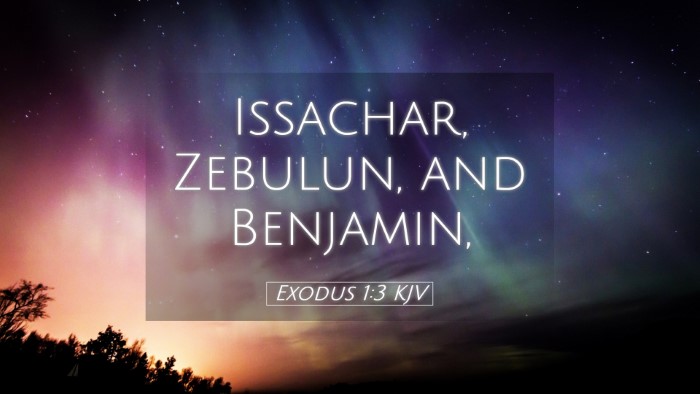Commentary on Exodus 1:3
Verse: Exodus 1:3 - "Simeon, Levi, and Judah, Issachar, Zebulun, and Benjamin."
Contextual Overview
This verse is nestled within the narrative of Exodus, which recounts the Israelites' transition from a favored status in Egypt to their eventual oppression as slaves. The listing of the sons of Jacob, specifically the tribes of Israel that emerged from them, is significant as it sets the stage for understanding the identity of the Israelite people and God's covenant promises.
Insight and Analysis
From Matthew Henry: Henry notes that the mention of these tribes signifies not only the continuity of the covenant but also God’s faithfulness to His promise to multiply Abraham's descendants. The genealogical record emphasizes the importance of lineage, establishing the Israelites as a people with a distinct identity rooted in God’s covenant.
From Albert Barnes: Barnes highlights that each tribe represented had a unique characteristic and role within the larger narrative of Israel's history. The reference to the key tribes such as Judah—often recognized as the tribe of kings—hints at the beginnings of socio-political structures that would shape Israel's future. He suggests that understanding these tribes provides insight into the unfolding purposes of God in history.
From Adam Clarke: Clarke expands on the concept of God's providence in history, implying that the mention of these tribes suggests that God's plans are often hidden in the details of familial ties and national identities. He urges readers to acknowledge the providential hand of God at work even from the outset of Exodus’ narrative.
Theological Significance
The listing of these names serves several theological functions:
- Covenantal Faithfulness: The mention of specific tribes reaffirms God's promise to Abraham, Isaac, and Jacob, demonstrating His unwavering commitment towards their descendants despite their changing circumstances.
- Identity Formation: For pastors and theologians, these verses are crucial for addressing issues of identity, both for the Israelites and for contemporary believers. It raises questions about how identity is formed and maintained in the contexts of suffering and resilience.
- Historical Context: Understanding the tribes helps discern the sociocultural landscape of ancient Israel, as Clarke implies, placing the Israelites in the broader historical narrative of God's dealings with humanity.
Practical Application
The message for students, pastors, and scholars is profound. This verse acts as a reminder of God's providential workings and offers a call to embrace both individual and corporate identities. In a modern context, it prompts reflection on how lineage, heritage, and God's promises shape our lives today.
Encouragement for the Church: Just as the tribes of Israel were preserved through trials, so too can the Church embody resilience through faith, aligning with the teachings of both Barnes and Clarke on God’s unbroken fidelity through times of adversity.
Conclusion
In summary, Exodus 1:3 serves not only as a genealogical reference but deeply enriches our understanding of God’s faithfulness through history. As commentators like Henry, Barnes, and Clarke elucidate, this scripture invites us to explore the profound depth of God’s covenant relationship with His people—emphasizing themes of identity, historical fidelity, and divine providence that are applicable for all believers seeking to understand their place in the ongoing story of redemption.


